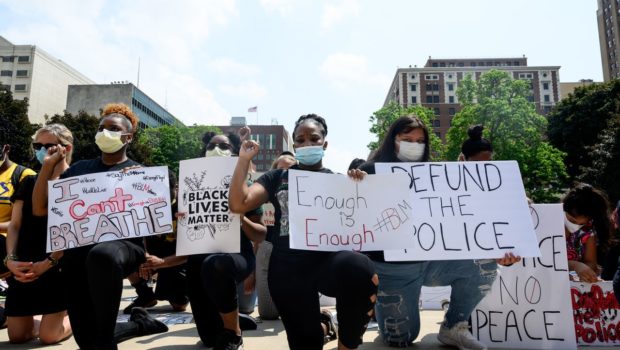Banning use of facial recognition technology among Michigan lawmakers’ proposed police reforms
Members of Michigan’s Legislative Black Caucus called to ban law enforcement agencies from using facial recognition technology to identify suspects as part of wide-ranging recommendations to reform police operations.
The use of facial recognition technology in law enforcement cases recently resulted in the erroneous arrest of a Farmington Hills man, and critics say the technology misidentifies people of color and impedes on privacy rights. The technology is still used in the city of Detroit, where Police Chief James Craig has defended its use.
“This is a perfect example of what we mean by defunding the police, in its current form,” Rep. Sherry Gay-Dagnogo, D-Detroit, said during a virtual press conference Wednesday. “It’s a waste of money...Rates of incarceration are already disproportionate. Let’s abolish it.”
The suggestion was made as part of a series of recommendations to reform police operations in Michigan led by state Reps. Tenisha Yancey, D-Harper Woods, Sherry Gay-Dagnogo, D-Detroit, Tyrone Carter, D-Detroit, and Sarah Anthony, D-Lansing.
Carter, a former law enforcement officer, said he considers facial recognition a tool for law enforcement, but not one that should be used “until we clear all the bugs out of this system.”
“Especially in this climate right now, I think that the appetite for facial recognition in the city of Detroit is not that great,” he said.
Related: Police killing of teen 40 years ago was Flint’s own George Floyd moment
Throughout Michigan and across the U.S., protests against police brutality and how law enforcement interacts with people of color have continued since late May, sparked by the death of George Floyd - who died after a Minneapolis police officer kneeled on his neck for almost nine minutes.
Many of the proposals put forward by Michigan lawmakers Wednesday are comparable to ideas endorsed by Gov. Gretchen Whitmer’s administration and Attorney General Dana Nessel, including requiring independent investigations where use of force by a police officer results in injury or death.
Other concepts included in the plan include creating a public registry for police misconduct, eliminating immunity for officers who use excessive force, creating public databases of police stops by race, sending crisis intervention teams to the scene for people in need of additional assistance and classifying false 911 calls as a hate crime.
“We are tired of being tired - tired of pointlessly losing the lives of our brothers and sisters,” Yancey said.
Carter also said he’s pushing for more guidelines around what constitutes acceptable use of force and supports banning chokeholds, prohibiting no-knock warrants and preventing law enforcement agencies from using pepper spray, tear gas and rubber bullets to disperse protests.
It’s unclear where the proposals will land in the Republican-led Michigan Legislature. In the Senate, a bill requiring mandatory bias training for police passed unanimously and is now before the House for further consideration.
In a June 23 interview with MLive, House Speaker Lee Chatfield, R-Levering, said his current priority is to listen and to “find ways that we can ensure the laws of our state are being followed and enforced equally.”
“I’m always open to the conversation on additional education and ensuring that our police officers have the tools and the education they need to be successful,” he said. “I think we should be rewarding the good police officers in our community while also ensuring that we’re rooting out the bad actors.”
Gay-Dagnogo said Chatfield has met with members of the Legislative Black Caucus and committed to finding some common ground on police reform, adding, “we’re looking forward to keeping him at his word.”
Related coverage:
Michigan Attorney General Dana Nessel wants to take retirement benefits from bad cops, other possible reforms
Whitmer supports banning chokeholds, wants more accountability for Michigan law enforcement
Michigan police brutality protests have cooled, but Detroit’s recent flare-up points to fragile calm








Gloss